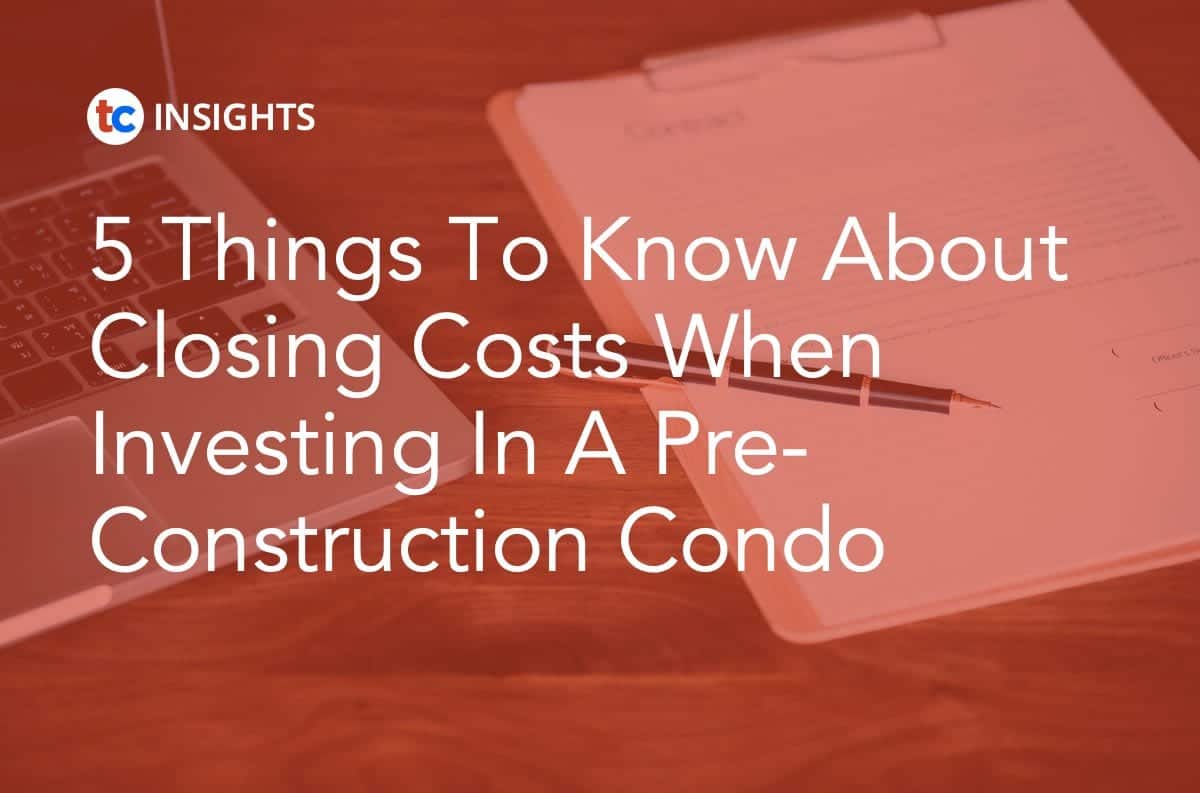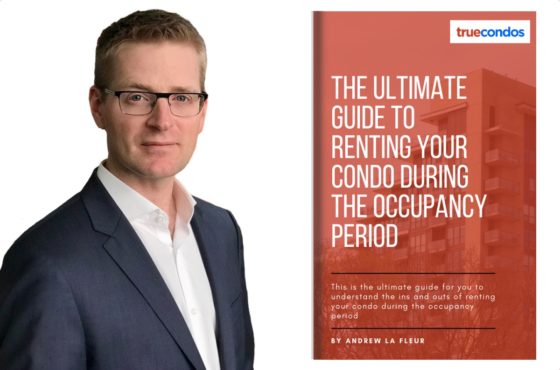5 Things to Know About Closing Costs When Investing in a Pre-Construction Condo

When it comes to closing costs on pre-construction condos, there is a lot of misinformation out there.
You may have heard some horror stories of buyers being hit with closing costs of $50,000 in extra costs on final closing, and you start to wonder why are thousands of people buying pre-construction condos every year in Toronto if this were true?
The reality is that if you are educated and prepared when buying a new condo, closing costs are nothing to be worried about.
Here are 5 things every condo investor should know about closing costs for pre-construction condos:
1. Closing costs are different for every pre-construction condo in Toronto.
There is no set amount of closing costs for every condo.
There is no rule of thumb that closing costs should be this much or a certain percentage of the price.
It depends on what is written in your agreement of purchase and sale with the builder and of course what price you are paying for the unit.
That being said, usually, if buying a pre-construction condo in Toronto in 2021, you can expect out of pocket closing costs for most condos to be approximately $20-30K for a studio or 1 bedroom condo, and approximately $30-40k for a 2 bedroom or larger condo.
2. Here are the biggest and most common closing costs you need to know about when buying a new condo in Toronto:
Here are the major items that you can always expect to pay for when purchasing a pre-construction condo:
Land Transfer Taxes
Land Transfer taxes can often be your single biggest expense on closing.
Toronto has provincial and municipal land transfer taxes. Approximate cost for units under $350k is 1% for provincial and 1% for Toronto land transfer tax.
When you go over $350k, the rate is more than 1%.
For example on a $600K condo in Toronto you are paying approx $17K in total land transfer taxes. On $800K condo would be approximately $25K in total land transfer taxes.
Development Charges
Your other big expense on closing are development charges or development levies as they are also called.
This is where the biggest change has occurred on closing costs in the last 5 years in Toronto.
5 years ago you would rarely see development charge over $5K.
Today, you never see a charge for less than $5K and they can be as much as $20K or more.
The reason? The city of Toronto (and other GTA municipalities) have dramatically increased development charges.
In the last couple years especially fees have increased by as much as 100%.
Cities are broke and they are looking at developers as the golden goose to help them make up for their perpetual budget shortfalls.
So as condo buyers we can and should expect fees to be higher in the years to come than they are now.
Also, in the old days, you would typically see just 1 charge for development levies on your final statement of adjustments.
Now today, you often will see multiple charges which are all essentially various forms of development charges or development taxes from the municipality.
The sub headings you might expect to pay under the banner of development charges include:
Education Levies. These are levies dedicated specifically for building new schools in the city.
Section 37 levies. These are levies are essentially cash payments (legal bribes) builders can sometimes make to the city in exchange for zoning approvals or extra density. I.e. I will pay you $5m if you let me build 30 storeys instead of 20. Cost is often passed onto buyers who pay their proportionate share.
Public Art Levies. Similar to section 37, the builder agrees to create public art displays in the development in exchange for zoning approvals. The cost of the public art is sometimes passed on to purchasers who pay their proportionate share.
Parks Levies. Similar to education levies, only the money is meant to build new park space in the city.
Other “Municipal Charges”. This is a new one we are starting to see as of 2018. A generic heading which could be anything. The city is broke and they are charging developers millions and these costs are past on to the purchasers.
Important note: Development charges are subject to HST. So if you are paying $10k in development charges really you have to pay $11,130
So what’s the total amount you can expect to pay for development charges when buying a pre-construction condo in Toronto?
As of 2021, expect to pay around $8-$10k for 1 bedrooms or studios, and around $12-18k for 2+ bedrooms.
Legal Fees
In Ontario when you buy real estate you must have a lawyer handle your closing.
The amount of legal fees you can expect to pay varies widely depending on your lawyer.
Fees including everything usually will usually be somewhere between $1500-$2500.
TIP: ask your lawyer for a complete breakdown of exactly what is included in their fees, and what is NOT included.
One thing I have seen many times over my career is that lawyers who seem very low cost are not including many items like disbursements, couriers, photocopies, title insurance and HST in their fees they quote.
So cheaper is not always really cheaper, and of course cheaper is not always better!
Second TIP: if you are buying pre-construction, make sure your lawyer is very experienced in handling pre-construction purchases as they are not the same as resale purchases.
Note: Legal fees are subject to HST.
Utility Hook ups.
When you purchase a new condo, the utilities have to be connected for the first time and you usually pay for this.
Think gas, water, hydro.
Sometimes you are charged one fee for all utilities that are hooked up, sometimes you are charged a separate fee for each of them.
Typically expect to pay around $500-2000 for utility hookups, depending on if you are charged separately for each hookup or not.
Tarion Warranty.
Yes, you get a warranty with your new home, but you have to pay for it. Usually around $600-$1000 for most investment units Check out this blog post for more info about Tarion Warranty Enrolment Fees.
Note: Tarion fees are subject to HST
Miscellaneous fees and charges
(These include law society fee, deposit cheque administration fees, mortgage discharge fees, status certificate fees). These usually amount to approximately $1000 for a typical condo contract.
3. You should get as many of your closing costs capped as you can
In general, you should always try to get all of your closing costs capped at a maximum amount whenever you can.
This is especially true for development charges.
Development charges (also called development levies) are fees charged to the developer of any new home or condo by the local municipality.
As a buyer, to protect yourself, you should always make sure that all development charges are capped at a maximum amount in your agreement of purchase and sale with the builder (your contract).
Let me state that again, development charges should ALWAYS be capped!
If the developer you are buying from says they will not put a cap your development charges, be aware that you are opening yourself up to the risk of fees being any amount on your closing day.
Development charges are supposed to pay for the many things associated with building new residential units like sidewalks, lamp posts, streets, parks, schools, hospitals, etc
The problem with development charges is that they are not charged by the city until final closing.
So you don’t know what the city is going to charge because the building won’t be completed for 3-4 years after you sign your contract (assuming you are buying pre-construction).
So when the city is constantly raising these fees, you open yourself up to potential risk as a buyer.
When you cap your development charges, this means that they cannot exceed the capped amount.
If you don’t have a cap, and the city decides to double or triple the development charges between the time you buy your unit and the time the building closes, you could be on the hook for any possible amount. It could be in the tens of thousands of dollars for this one thing alone.
TIP: understand the difference between hard caps and soft caps – a hard cap is the max amount the development charge can be. Period. A soft cap is a cap on the increase in development charges between when you sign and when the building closes. Some developers use this trick where you pay one amount for the development charge plus another amount for the increase in development charge that occurs during the period of construction. Make sure you have a good lawyer on your side to know what you can expect to pay on closing!
4. Closing costs are generally rising every year in pre-construction condos.
In general, closing costs are consistently going up.
This is mostly because cities are broke, and they are constantly adding more fees to new housing on developers.
What was considered ‘high’ for closing costs 2 years ago, might be ‘low’ today.
Make sure you are working with an agent and a lawyer who works in pre-construction and can advise you on what to expect.
Just recently development levies nearly doubled in the city of Toronto in a single year for example.
Developers of course all protested, but at the end of the day if the market is willing to pay for it, the city will keep increasing them.
This underscores the point that you must always have your development charges capped in your agreement, but it also means that just because you got a cap of $5000 this year, doesn’t mean you will the next time you buy.
5 years ago, a cap of $2000-$3000 was normal in most agreements. Now today it’s $8000-$20000.
On the bright side, these charges are an inflationary pressure on prices which ensures that real estate values will continue to rise across the GTA.
Investing in hard assets like real estate is a great hedge against inflation.
5. You might have to pay HST as part of your closing costs
Most developer price lists will say “prices include HST”. And if you ask most developer’s sales reps they will tell you that the prices include HST.
But here’s the thing, the prices only include HST if you are moving into the suite yourself or someone in your immediate family is moving in as their principal residence.
If you are an investor and you will not be moving in, then you will be required to disclose this fact to your lawyer at final closing and you will no longer qualify for the built-into-the-price HST rebates.
In short, for units under $350k, investors should expect to pay approximately 7.8% of the purchase price on final closing as HST.
For units over $450K, expect to pay a flat amount of $24,000 in HST on closing.
So is this money gone, out of your pocket forever? No.
The good news is that you can apply to get this money back from the CRA.
The good news is that if you purchase a condo for investment under $350k, you should get 100% of the HST rebate back (as long as you are renting out your unit) and it only takes about 1 month to get the money back after applying to the CRA.
In the majority of cases, you should expect to get back all the money you paid.
In a few cases, you might get back everything less a maximum of $6300.
The HST calculations on new housing in this province are admittedly complicated and convoluted, but what else would you expect from our government??
HST is something you need to budget for on final closing but it’s not really a “cost” because in most cases you get all or nearly all of this money back.
For more information on HST and condo investing, including how to apply to get your rebate back, I strongly recommend you check out the many other articles, podcasts, and videos we have on this site here.
Bonus point #6: Closing costs may also include other costs that are not necessary closing costs per se
Developers may also ask you to pre-pay for certain expenses at final closing. These are not necessarily closing costs, because you have to pay them anyway, but you do need to budget for the possibility that you have to pay them.
The biggest example of this would be property taxes.
The developer has the right to make you pre-pay up to 2 years of property taxes up front on final closing.
This money is of course remitted to the municipality, but purchasers need to be aware of this.
Again, you should not consider this a closing cost, as it is an ongoing expense of owning any property that you would have to pay now or later no matter what.



